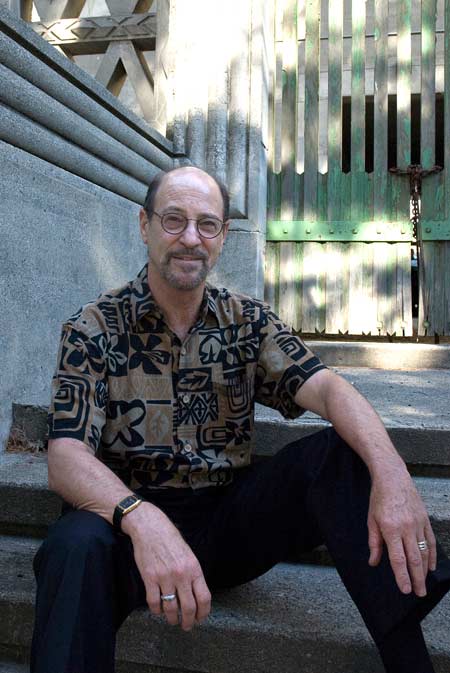Campus bids Lustig farewell
From planner to associate vice chancellor, Steve Lustig has spent his 26-year career at Berkeley working on issues with direct community impact.
| 02 October 2009
 Steve Lustig (Wendy Edelstein)
Steve Lustig (Wendy Edelstein)BERKELEY — Steve Lustig arrived in Berkeley as a transfer student in 1964, during the Free Speech Movement an era, he says, that has informed his whole life. "My involvement in the FSM," he recalls, "taught me how people working together, anchored in visions and values, can make a difference."
It's easy to trace the progressive ideals espoused by the activists of yore in Lustig's 26-year career at Berkeley, which has centered on community building and the intersection of health, education, and multicultural diversity.
As associate vice chancellor for Health and Human Services a position, recently eliminated for budgetary reasons, from which he will retire later this month Lustig oversees University Health Services (UHS); Human Resources; Environmental Health and Safety; Disability Management Services; the Staff Ombuds Office; and several initiatives and committees. His focus, however, has gone beyond the Berkeley campus to include the broader local community, and he has worked to build bridges between the two.
In 1983, when Lustig began his administrative career at Berkeley, he was already well-acquainted with the campus. He'd earned his B.A. in social science and anthropology and two M.A.s (in medical anthropology and in folklore here, and was a teaching associate in anthropology in the early '70s. Understanding the different sectors of campus, he says, has helped him identify the needs of its various constituencies.
Lustig was hired to help envision a campus-based health program and to evaluate what that program would be when Cowell Hospital, a 100-bed facility, was closed down. The studies Lustig supported in the mid-1980s led to the decision to establish and build the Tang Center on an off-campus parcel, a complex project he ranks among his proudest accomplishments. (Cowell Hospital, demolished in 1993, was later replaced by the Haas School of Business.)
"Steve sees opportunities and openings that maybe aren't immediately visible," says Assistant Chancellor Phyllis Hoffman, who has worked with Lustig for more than 20 years. "His ability to entertain many ideas simultaneously helped him transform Cowell Hospital into an integrated outpatient facility for the Berkeley campus."
Claudia Covello, executive director of UHS, concurs: "One of Steve's most significant contributions was his broad vision of health as including the well-being of the entire campus community. His passion led to the development of an integrated campus health department that addresses the spectrum from prevention to treatment for faculty, staff, and students."
Before returning to Berkeley at age 38, Lustig worked in the public sector for community agencies and school districts, participated on the Berkeley school board and in statewide politics, and served as a community organizer for a year on Chicago's Southside. Since 1994 he has served on the board of nearby Stiles Hall, which supports mentoring of underrepresented students in the community. Bringing disparate constituents together has been an ongoing thread in his work a reflection, he says, of "the value I place on multiple points of view, empowerment, inclusion, and getting people engaged."
Lustig's additions to the array of health and counseling services at the Tang Center include eldercare programs, campus health-and-safety programs, and expanded student-mental-health programs. He's particularly proud of UHS's Work/Life Program, which has established policies and procedures to help staff and faculty balance the off-campus demands of life with those of on-campus work.
Issues of empowerment
Lustig also helped develop "communities of practice," groups of campus staff from different units and departments who do similar jobs: They hold meetings, host speakers, and use shared knowledge to further their careers and learn more about the campus. For Lustig, building voluntary staff engagement on campus is an issue of empowerment.
His career trajectory has led to increasingly senior leadership positions, from UHS to the Chancellor's Cabinet. From 2002-07 he directed the Campus Community Initiative, which was begun by Chancellor Robert Berdahl. With Chancellor Robert Birgeneau's arrival and support, such initiatives as City/University Partnerships, the campus Principles of Community, and, ultimately, the Division of Equity and Inclusion, all came to fruition.
Before leaving the faculty for his administrative post, Vice Chancellor for Equity and Inclusion Gibor Basri collaborated with Lustig on several committees that led to the establishment of the Equity and Inclusion control unit. "I will greatly miss Steve's counsel," says Basri, who calls his friend "talented, congenial, and committed."
More recently, Lustig has focused on how the campus manages its workforce. That effort has included creating the Center for Organization and Workforce Effectiveness and rolling out Career Compass, the campus's multifaceted workforce initiative. "It's important for staff to know that as they develop their careers, there will be a career path," says Lustig. "That won't change even with decreased funding and staffing levels."
In retirement, Lustig plans to pursue activities for which he hasn't had time: photography, learning new languages, playing music, and spending more time with his children and five grandchildren.
"I'm a very engaged person, so I know I'll continue doing work in the community as well," he says. He's a longtime volunteer with agencies such as Stiles Hall and Lifelong Medical Care in Berkeley. The work is rewarding, he says, because "you feel you're having a positive impact on people's lives."

